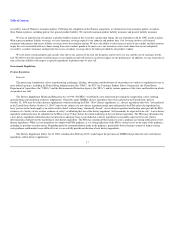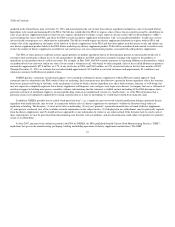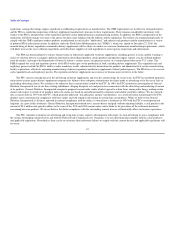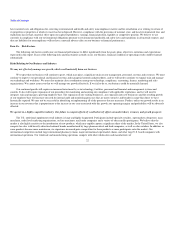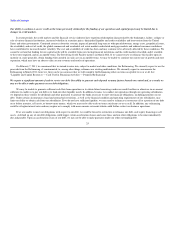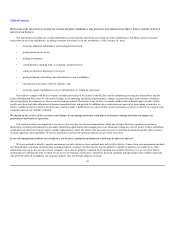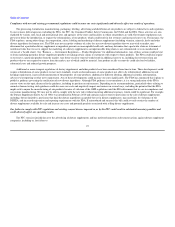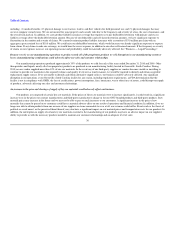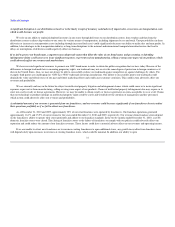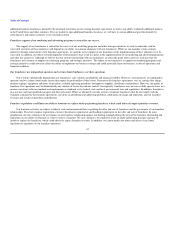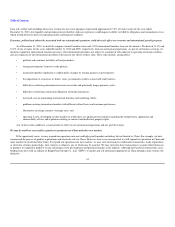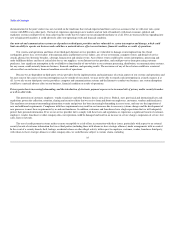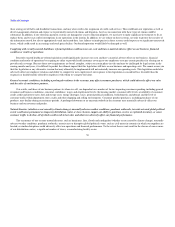GNC 2011 Annual Report Download - page 29
Download and view the complete annual report
Please find page 29 of the 2011 GNC annual report below. You can navigate through the pages in the report by either clicking on the pages listed below, or by using the keyword search tool below to find specific information within the annual report.
Table of Contents
Compliance with new and existing governmental regulations could increase our costs significantly and adversely affect our results of operations.
The processing, formulation, manufacturing, packaging, labeling, advertising and distribution of our products are subject to federal laws and regulation
by one or more federal agencies, including the FDA, the FTC, the Consumer Product Safety Commission, the USDA and the EPA. These activities are also
regulated by various state, local and international laws and agencies of the states and localities in which our products are sold. Government regulations may
prevent or delay the introduction, or require the reformulation, of our products, which could result in lost revenues and increased costs to us. For instance, the
FDA regulates, among other things, the composition, safety, labeling and marketing of dietary supplements (including vitamins, minerals, herbs and other
dietary ingredients for human use). The FDA may not accept the evidence of safety for any new dietary ingredient that we may wish to market, may
determine that a particular dietary supplement or ingredient presents an unacceptable health risk, and may determine that a particular claim or statement of
nutritional value that we use to support the marketing of a dietary supplement is an impermissible drug claim, is not substantiated, or is an unauthorized
version of a "health claim". See "Business — Government Regulation — Product Regulation" for additional information. Any of these actions could prevent
us from marketing particular dietary supplement products or making certain claims or statements with respect to those products. The FDA could also require
us to remove a particular product from the market. Any future recall or removal would result in additional costs to us, including lost revenues from any
products that we are required to remove from the market, any of which could be material. Any product recalls or removals could also lead to liability,
substantial costs and reduced growth prospects.
Additional or more stringent regulations of dietary supplements and other products have been considered from time to time. These developments could
require reformulation of some products to meet new standards, recalls or discontinuance of some products not able to be reformulated, additional record
keeping requirements, increased documentation of the properties of some products, additional or different labeling, additional scientific substantiation,
adverse event reporting or other new requirements. Any of these developments could increase our costs significantly. The FDA has announced that it plans to
publish a guidance governing the notification of new dietary ingredients. Although FDA guidance is not mandatory, it is a strong indication of the FDA's
current views on the topic discussed in the guidance, including its position on enforcement. Depending on its recommendations, particularly those relating to
animal or human testing, such guidance could also raise our costs and negatively impact our business in several ways, including the potential that the FDA
might seek to enjoin the manufacturing of our products because of violation of the GMP regulations until the FDA determines that we are in compliance and
can resume manufacturing. We may not be able to comply with the new rules without incurring additional expenses, which could be significant. For example,
the Dietary Supplement Safety Act (S 3002) was introduced in February 2010 and contains many restrictive provisions on the sale of dietary supplements,
including, but not limited to, provisions that limit the dietary ingredients acceptable for use in dietary supplements, increased fines for violations of the
DSHEA, and increased registration and reporting requirements with the FDA. If reintroduced and enacted, this bill could severely restrict the number of
dietary supplements available for sale and increase our costs and potential penalties associated with selling dietary supplements.
Our failure to comply with FTC regulations and existing consent decrees imposed on us by the FTC could result in substantial monetary penalties and
could adversely affect our operating results.
The FTC exercises jurisdiction over the advertising of dietary supplements and has instituted numerous enforcement actions against dietary supplement
companies, including us, for failure to
27


